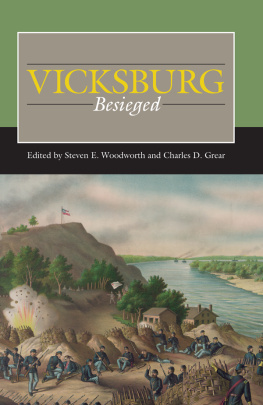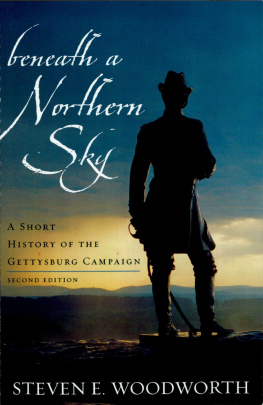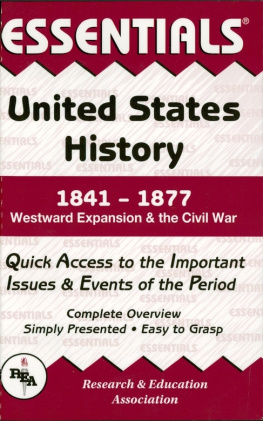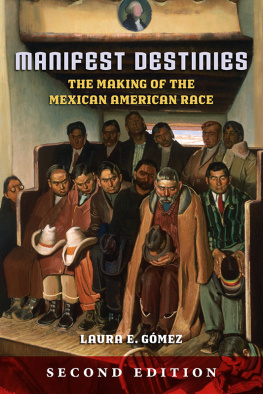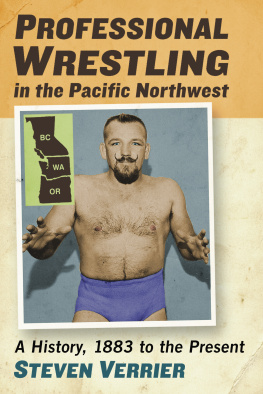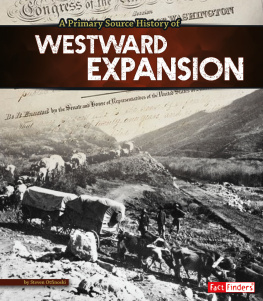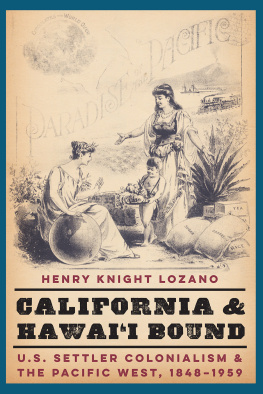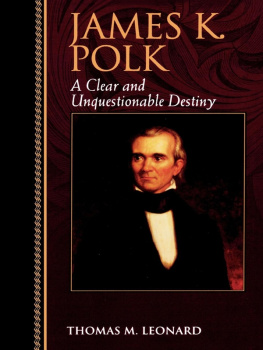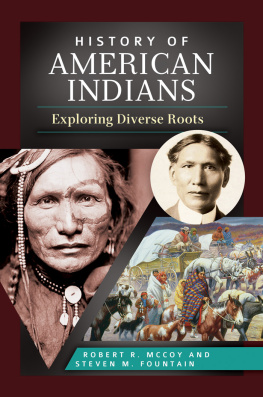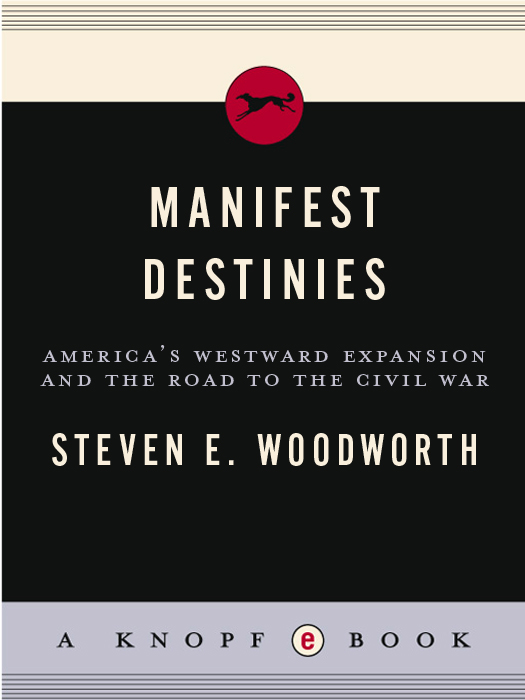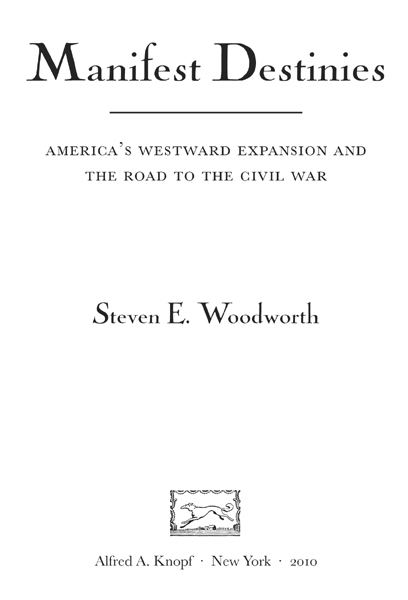ALSO BY STEVEN E. WOODWORTH
Nothing but Victory
Beneath a Northern Sky
A Scythe of Fire
While God Is Marching On
Six Armies in Tennessee
Davis and Lee at War
Jefferson Davis and His Generals
THIS IS A BORZOI BOOK
PUBLISHED BY ALFRED A. KNOPF
Copyright 2010 by Steven Woodworth
All rights reserved.
Published in the United States by Alfred A. Knopf, a division of Random House, Inc., New York, and in Canada by Random House of Canada Limited, Toronto.
Knopf, Borzoi Books, and the colophon are registered trademarks of Random House, Inc.
The photograph of Independence Rock appears courtesy of the Library of Congress. All other images except that of Richard Mentor Johnson and the William S. Jewett portrait of John C. Frmont appear courtesy of Wikimedia Commons.
Library of Congress Cataloging-in-Publication Data
Woodworth, Steven E.
Manifest destinies : Americas westward expansion and the road to the Civil War / by Steven E. Woodworth.1st ed.
p. cm.
eISBN: 978-0-307-59464-8
1. United StatesTerritorial expansion. 2. Manifest Destiny. 3. Mexican War, 18461848. 4. United StatesHistory18151861. 5. United StatesHistoryCivil War, 18611865Causes. I. Title.
E 179.5. W 65 2010
970.04dc22 2010016843
v3.1
To seven excellent scholars and colleagues
Brian Melton, Charles Grear, Jason Frawley,
John Lundberg, David Slay, Paul Schmelzer, and Leah Tarwater.
To God alone be the glory.
CONTENTS
PART ONE
The Two-Party System
PART TWO
Westward Expansion
PART THREE
The Politics of Expansion
PART FOUR
War with Mexico
PART FIVE
The Political System and the Controversies of Expansion
MAPS
PREFACE
Abraham Lincoln famously referred to the United States, founded four score and seven years before the time of his speaking, as a nation conceived in liberty, and dedicated to the proposition that all men are created equal. On the November day in 1863 when Lincoln spoke those words, he and his audience were painfully aware of the fatal flaw in the Republic the founders had established, the contradiction personified in the life of the very man who had penned the statement to which Lincoln was alluding. Thomas Jefferson, chief author of the Declaration of Independence, with its claim that all men are created equal, was a slaveholder.
Slavery was the negation of American ideals of liberty, and the founding generation was almost as painfully aware of the fact as was Lincolns own. That first generation of United States citizens remained blissfully ignorant of the price that inconsistency would ultimately exact on their country, and they could believe, with no more wishful thinking than comes naturally to humans, that the institution of slavery would die a natural death in America within another generation or two. Through the interaction of the cotton gin, the steam loom, the rich expanse of available farmland in the Deep South states, and the worldwide demand for cotton textiles, slavery did not die in America but rather grew. What John C. Calhoun called the Souths peculiar institution became more than ever the basis of southern wealth, and white southerners, whether slaveholders or not, came to regard it as indispensable not only to their regions economy but also to their social fabric, which was based on the unquestioned supremacy of the white race.
The flaw thus remained in the edifice of American liberty, but for many years the country was able to ignore the issue of slavery and function as though it did not exist. A couple of constitutional provisions and a federal law or two protected the rights claimed by slaveholders, but otherwise the federal government took almost no cognizance of slavery during the nations first thirty years. During those decades the United States grew in size and strength and in the freedom that it recognized for all its citizensbut not for the slaves. And during those years the American people remained, with few exceptions, oblivious to their nations chief moral problem and went about their own business, caring for their families, enjoying freedom, and seeking economic success, in many cases by moving west.
Americans had been a westering people since the first hardy pioneers had planted their homesteads just beyond the sight and smell of salt water in the colonies of the early seventeenth century. Freedom, opportunity, and a fresh start all beckoned Americans to the edge of settlement, a line that crept steadily west through colonial times and then, without pause, after independence. When in the middle of the 1840s a New York newspaperman wrote that it was Americas manifest destiny to overspread the continent, he was merely putting into words what the great mass of his countrymen had felt for more than two centuriesthat the extension of what Americans liked to call the Empire of Liberty to encompass the whole length and breadth of North America was a blessing and an example to all mankind. What was special when John L. OSullivan coined that phrase was that his generation of Americans seemed to be rushing toward the culmination of this goal with a speed their forefathers had never imagined. It appeared that the nation could fulfill its great territorial ambition without dealing with the moral problem that contradicted the ideas of liberty on which it prided itself.
The problem of slavery sometimes reared its head to disturb the peace and happiness of the young Republic. Most notably this occurred in 1819 and 1820 after the new state of Missouri petitioned Congress for admission to the Union as a slave state. A slave state that far north, and where no slavery had existed prior to U.S. acquisition, was a disturbing development to northerners who saw in it the proof that slavery was not, in fact, going to wither away, but was instead becoming the normal arrangement of economy and society in the United States. When these northerners objected to Missouris admission without a provision that its slaves eventually be freed, white southern leaders reacted fiercely, and a crisis developed that the aged Jefferson described as being like a fire bell in the night [that] awakened and filled me with terror. With difficulty, the politicians of that era worked out a compromise, allowing slavery in some territories and not in others, that once again suppressed the issue of slavery and banished it from the national political arena.
In the two decades after the 1820 Missouri Compromise, Americans reacted to Jeffersons nocturnal fire bell in different ways. White southerners became more committed than ever to slavery, and some of them began to think that the Missouri Compromise had been a bad bargain, that their leaders should never have conceded that Congress or any power had the right to prohibit slavery in any territory of the United States. Northerners were of different minds on the subject. Some accepted slavery as the natural order of things and wanted no one to interfere with it. A small but growing minority took an opposite view, seeing slavery as the moral wrong it was and believing that the country must face that issue squarely and make the right choice by abolishing the peculiar institution. Still others recognized slavery as a moral wrong but believed that it could be solved better later, or at least that it could not be solved at present. They saw no reason to tear down the American Temple of Liberty (another favorite expression in that era) in the vain quest for moral perfection.


